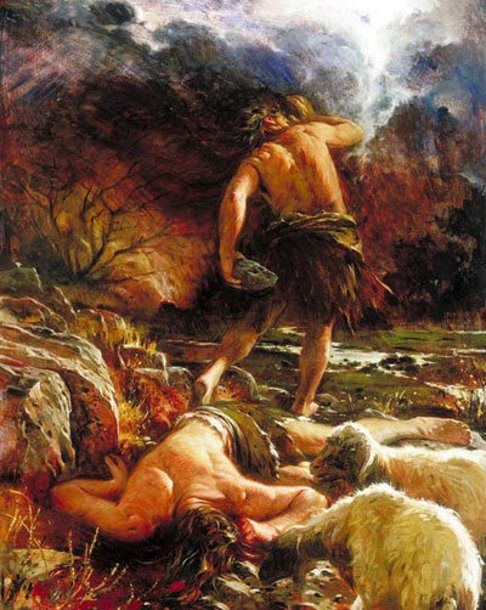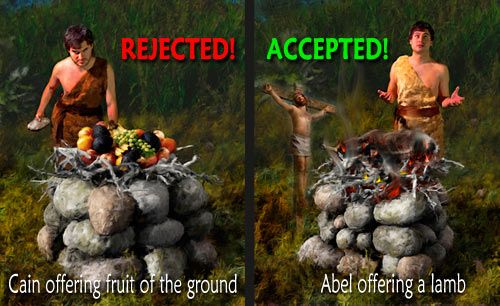BLOOD THAT SPEAKETH BETTER THINGS (1)

His divine blood speaks better things than that of Abel
1) Two people had blood running through their veins. They both lived on planet earth. Each one of them – offending not the adversary – maliciously had the issue of the running scarlet fluid of earthly existence stopped functioning, cutting off the source of life. Both had to lift up a voice of prayer to the Author of creationism. The first to die on planet earth was murdered in cold blood by his own brother, when humans were a handful few. “Avenge my untimely demise [Genesis 4:10],” he ceaselessly voiced in solicitation to the Most High. It was not in consonance with the intent of Jehovah: to treat His offending Adamic creatures with any dose of malevolence. The Second is the Last Adam, and when faced with the irrationality of man’s proclivity cried out, in favour of His assailants, “Father forgive them, for they know not what they do” [Luke 23:34].
Abel made his antediluvian appeal from the proclivious stance of carnality. Jesus Christ, on the other hand, went into the nobility of deep calleth unto the empyreal deep, accentuating the eternal depth of Jehovah’s seat of mercy.

“…the voice of thy brother’s blood crieth unto me from the ground” (Gen 4:10).
Many people would see the ‘blood of Jesus speaking better things than that of Abel’ looking at the Adamic soul from the account of Genesis 4:9-10 “And the LORD said unto Cain, Where is Abel thy brother? And he said, I know not: Am I my brother’s keeper? 10) And he said, What hast thou done? the voice of thy brother’s blood crieth unto me from the ground.” The Adamic creature, having been forced to experience the stark harshness of cruelty, has totally been rendered an egregious vindictiveness.
A dislimned soul finds it almost impossible to remain rational owing to torturous confrontation with a sullied phenomenality of nature. Overwhelmed with excruciating grief over the loss of a very promising life of Godliness, cut short by the flagitious madness of a Cain whose continued existence is inglorious before the LORD God, Abel could not hold, in suppression, his angst against the injustice meted out on him, the third man of Adamic creation. “Lord, how could my life be sniffed out at the prime of my earthly days?” Abel kept asking the Creator. “Avenge this murderous perpetuation of Satanism,” that was the plea of Abel. Was Abel not justified in his adjudicatory pursuit? Certainly, he was right, very right in asking for divine adjudication. What the word of God says is: “that speaketh better things than that of Abel.” In comparative sense, Abel’s blood is good, while that of Jesus is ‘better’.

The beseeching philippic of the pour from the lips of Abel was not, in any way, evil. He was totally consumed by a visceral conviction of Cain’s guilt. It is, to Abel, rationally tenable. Cain was too blinded by wickedness to see his crime standing in judgment before God. Satanically, he could not care at all. In His infinite mercy, God would not apply Adamic irrationality. “And to Jesus the mediator of the new covenant, and to the blood of sprinkling, that speaketh better things than that of Abel” (Hebrews 12:24). The word ‘speaketh’ laleō (lal-eh’-o), means: ‘To utter a voice or emit a sound; To utter articulate sounds.’ If it is important for God to be merciful to mankind, it was then needful for Him to make a vocalization, out of His eternal heart of mercy, hence, ‘better things’ which in Greek is kreittōn (krite’-tohn): ‘more useful; more serviceable; more advantageous; more excellent.’

The blood that held the life essence of Abel demanded a vengeful justice. He was not wrong in his appealing philippic. Abel simply did not draw his visceral drive from the heart of God’s mercy. This is the reason why God would not use someone like Abel to make the soteriological covenant. Noah, whose righteousness saved fallen man from annihilation, was not good enough to take on mediatorial role for mankind. Not Moses, Samuel, David Paul, John or Peter could successfully assume the role of the Mediator between God and man. Only Jesus can save. Jesus as the Christ made the Old Testamentary covenant. Only the Initiator of the first covenant could have told them in Mark 14:24 “And he said unto them, This is my blood of the new testament, which is shed for many.” While Abel was eyes and heart fixed on “the soul that sinneth, it shall die” of Ezekiel 18:4, Jesus Christ, the Author of salvation was decided on Matthew 11:28 “Come unto me, all ye that labour and are heavy laden, and I will give you rest.”

Looking at Hebrews 12:24 contextually, it is the sacrifice of Abel which appealed to the Divinity that spoke words of agreement to the mind of God, this Pauline script is actually the didacticism. Abel’s sacrifice was accepted by the divine nostrils of the One which is, and which was, and which is to come. It was only good for that material time of its performance. It did just remit the shortcoming of Abel’s error for that time only. It could not even rectify his brother, Cain’s, aberrant use of the wrong element of sacrifice. Abel’s shedding of the lamb’s blood was good for remission of sin. It brought peace, from God, back to otherwise lost soul. But in comparison, the shed blood of the Golgotha from the earthly body of Jesus Christ cleansed Adam of the original sin. The superiority of the divine blood of Jesus washed away as many as would come to Him for salvation.

Getting born again is a conscious effort on the part of an individual. Get born again. Say this sinner’s prayer.
“Dear heavenly Father, I come to You now in the name of Jesus Christ. I believe in my heart that Jesus is the Son of God. I believe that Jesus died on the cross for my sin. I believe that You raised Him from the dead. I confess with my mouth that Jesus is Lord and I receive Him now as my Lord and my Saviour. I give God all the glory. Amen!”
(…to be continued…)
Read part 2 here
Visits: 193



